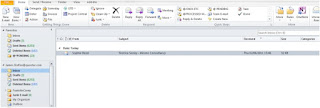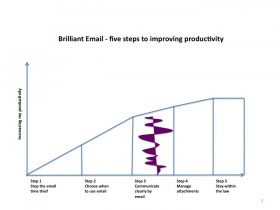I chose to disconnect last week whilst on leave. No email, no social media. Running the business (and me) was delegated to our very able Administrator. We agreed a process to minimise the post vacation email overload. Rules were set before leaving to folder all known lower priority emails (eg newsletters).
Meeting request would tentatively accepted. How often have you as a PA spent time arranging meetings in bosses absence and they return and have different priorities. One executive once said he felt his PA saw her role as filling up his diary with meetings which he and she then had to  undo as his priorities changed. How often does that happen to you when on leave? Used in this context ‘tentative’ takes on a new and useful function.
undo as his priorities changed. How often does that happen to you when on leave? Used in this context ‘tentative’ takes on a new and useful function.
Otherwise, If something was ultra-urgent we agreed she would call/text me.
On the second day sitting having pre-dinner drinks how did I feel watching the three others all with their heads in their iPhones and Blackberrys? Certainly not left out. Rather the reverse: included in the here and now and able to people watch and enjoy the gentle lapping of the waves as I relaxed and stayed calm. I can only image this must be what it’s like for a reformed alcoholic watching others drink whilst they nurse a lemonade.
A huge plus was the extra time to read instead of feeling I should decamp early from the pool and go and deal with the day’s email tsunami. The book was recommended by a colleague. I wanted to email and say how wonderful it was. But what value did it add for either of us? Had I done so there would have been an email chain which wasted both our times and added to the email overload.
Knowing the business was in safe hands was a wonderful feeling. Although one worry was that my personal emails come in on my work address. It is worth separating business and pleasure, but as Steve Jobs famously said he had only one email address. I make this work for me too. There is a Hotmail address but that is only used for signing up for white paper and special offers etc. None of which is life changing if not read for a week.
What of my social diary – golf matches and alike? Our Administrator dealt with any that looked like they required a response. So no lost golf games or party opportunities! Two years ago such arrangements were nearly all done by phone. Now of course it’s email, although some friends (and relatives) say they still prefer to talk. In some ways social engagements were better managed as there was time to think and consider instead of feeling one must make an instant response.
I was tempted to log in during the week and join in when everyone else had their heads in their iPhones etc, but a glass of whisky and the urge evaporated. After all having delegated, what would that say about the trust placed in our Administrator? Furthermore, why did I want to disrupt my calm mind. Also, previously I have made poor decisions when in holiday mode through lack of context and having all the necessary information to hand.
At the airport again the urge to hit connect welled up. As in my previous blogs my advice for dealing with the holiday email tsunami is talk before checking the email to prioritise and save trawling through stuff which does not merit your immediate attention. In my case it would be talk and read the ‘read me first email’ as my first day back in the UK was Saturday. I was two hours ahead of the UK so my briefing email would not be ready until we were in the air. Some food and drink soon took away the urge to log in.
On my return as expected, the junk had been trashed and the remaining messages prioritised.
Not logging in was as to paraphrase the great Diana Athill ‘ like excess cargo which needed to be dumped’. I came back feeling more relaxed and able to see the big picture again. Also an a huge bonus, no post holiday email overload and it was very easy to reach inbox zero on day one of my return.
Of those in the party that did log on. One person was asked why they did so when the manager did not? One said they were paid to be available to their clients at all times and yes, someone did want to meet them on Monday. Could it have waited? Probably yes. Did I miss email, twitter etc? No. In fact it has left me re-assessing the value of some of these tools.
What is your experience of no email days/weeks when on leave?
Tags: email addiction, email free vacation, email management training, email overload, inbox zero
As you trawl through your inbox on returning from leave are you wasting time sending unnecessary emails? Mimecast found that only one in four emails is really necessary. A recent Mesmo Consultancy survey found that senior executives felt that on average 44% of the emails they receive are not needed.
You return from leave to a severe attack of email overload as your inbox is overflowing. The temptation to scan the inbox and fire off a few replies will be hard to resist. Now you have little or no chance of creating an empty inbox as the chain mail syndrome kicks in. Here is a seven point plan to help you clear your inbox quickly and take some steps to reducing not only the holiday email overload but move towards inbox zero.
 |
| Seven steps to reducing holiday email overload |
The result – no email overload and you should reached inbox zero by reducing the rounds of unnecessary email ping-pong. Now you have time to turn your attention to other important tasks.
Do you have any tips to share about dealing with the holiday email overload backlog?
Tags: email overload, empty inbox, inbox zero
Starting with an empty inbox before going on leave is an excellent way to reduce email overload. Using the 4 Ds principle, set aside a few hours to clear out your inbox.
Handle each email once and use the simple 4Ds to help you decide what to do with it:
 |
| Inbox Zero |
The key is simply to make sure you don’t just leave emails lying unmarked and open in the inbox and relying on your memory to remember what needs attention.
More in the next blog on creating an empty inbox and reducing the email overload before taking leave.
For more daily tips and hints on reducing email overload follow me on Twitter as the ‘EmailDoctor’ or check out how Mesmo Consultancy can help you with our tried and tested workshops.
Tags: email overload, empty inbox, inbox zero
You receive an Out of Office Message, what is your natural reaction next time you want to email that person? Aside from a touch of jealousy as they are on leave and have escaped the daily dose of email overload, you just send them another email.
Is that the best email behaviour for those serious about stopping email overload and reducing the resulting wanton waste of time (estimated now to be half a day week).
One in five business users now receive in excess of seventy email a day. Yet our own and that of others research shows that less than a third of all incoming email is ever read. Take a week off and there will be at least 350 emails waiting for you.
 | ||
| My notebooks from our sponsor BomoArt |
There is a very high chance that your email will either be missed or redundant by the time its read. However the recipient may not know that and so more unecessary emails flood back into your inbox.
Be innovative. Don’t firing of more emails. Instead write down the things you want to email the person about and either send them one email on their return or and better still talk to them.
Now watch the email traffic go down along with the email overload. You might even find you too reach the empty inbox status more quickly.
This is part of an ongoing series of notebook stories to reduce email overload – see also my recent column in TechRepublic.
Dr Monica Seeley, founder of Mesmo Consultancy has spent the last fifteen years coaching and training people from a wide range of organisations and businesses to use email more effectively to improve personal and business performance and manage the risk associated with cyber crime. Monica is a Visiting Senior Fellow at Cass Business School City University and Bournemouth University Business School. She is passionate about helping people to save time by using email effectively and has written several books on the subject, the latest being Brilliant Email. She runs regular workshops,webinars and masterclasses on email best practice.
Tags: email management training, email overload, empty inbox, inbox zero, notebook stories, out-of-office messages
 |
| From Brilliant Email by Monica Seeley, Pearson, 2010 |
Can email etiquette help stop email overload and enable you to reach inbox zero status? In my book Brilliant Email, email etiquette is identified as step 3 for improving productivity – see diagram opposite.
Like any form of communication, it is about conveying the right message right first time and know when to stop the conversation and move on. In a previous blog I wrote about the importance of good grammar and spelling.
How often in an email do we leave ourselves open for the recipient to send a reply which adds little or nothing to the communication but means that out of courtesy we must reply again?
Take a look at the email chains in your inbox and I’ll bet you have quite a few which could have been terminated much earlier. For example, when you ask someone for information, to do something etc. There are often two or three quite unnecessary rounds of email ping pong as you each play what I call the ’email thank you game’.
Recipient – Yes OK will do.
Sender – Thank you.
Recipient – That’s OK.
Sender – By the way can it be done by 12.00 noon?
Recipient – Yes.
Sender – Thanks.
Etiquette suggest that we say thank you. But how about using brilliant email etiquette to reduce the number of rounds of the email thank you game and hence stop email overload.
Here is what I would say in my email as the sender.
Sender – Please can you do X and if possible by noon today. Many thanks for your help.
Recipient – Yes.
End of the email chain and a chance to reach inbox zero status more quickly.
For more ways to save time and reduce email overload by using an alternative medium why not come on one of our Brilliant Email masterclasses or webinars?
What email etiquette do you use to be courteous yet reduce the rounds of the email thank you game?
Tags: email communications, email etiquette, email overload, inbox zero